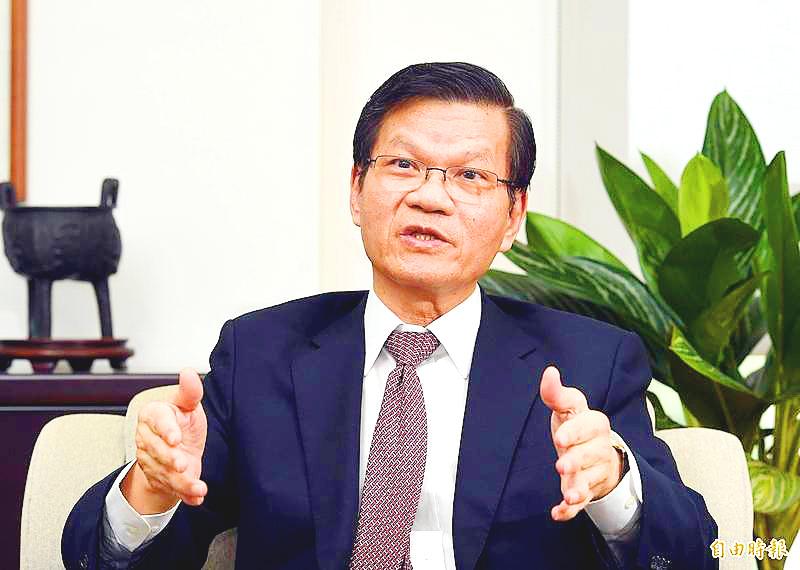Biochemist Wong Chi-huey (翁啟惠) has received a Chemical Pioneer Award for his outstanding contributions in the field of chemistry, Academia Sinica said in a statement yesterday.
The American Institute of Chemistry, a non-profit aimed at advancing chemical science, on March 31 announced that Wong and Alison Butler, a University of California chemistry professor, were this year’s recipients of its annual award.
Wong, who was president of Academia Sinica from 2006 to 2016, is a Scripps family chair professor in the Department of Chemistry at the Scripps Research Institute in San Diego and a research fellow at Academia Sinica’s Genomics Research Center.

Photo: Fang Pin-chao, Taipei Times
First presented in 1966, the Chemical Pioneer Award recognizes chemists or chemical engineers who have made outstanding contributions that have had a major impact on advances in chemical science and/or the chemical profession, the Institute of Chemistry said.
Wong was the first scientist to develop innovative chemoenzymatic methods, including the automated synthesis of oligosaccharides and glycoproteins, which are aimed at developing cancer vaccines, sugar chips, and antiviral and antimicrobial agents, Academia Sinica said.
The latest honor adds to a long list of awards that Wong has received, including the Welch Award in Chemistry from the US-based Welch Foundation last year and the UK-based Royal Society of Chemistry’s Robert Robinson Award.

Taiwan has received more than US$70 million in royalties as of the end of last year from developing the F-16V jet as countries worldwide purchase or upgrade to this popular model, government and military officials said on Saturday. Taiwan funded the development of the F-16V jet and ended up the sole investor as other countries withdrew from the program. Now the F-16V is increasingly popular and countries must pay Taiwan a percentage in royalties when they purchase new F-16V aircraft or upgrade older F-16 models. The next five years are expected to be the peak for these royalties, with Taiwan potentially earning

STAY IN YOUR LANE: As the US and Israel attack Iran, the ministry has warned China not to overstep by including Taiwanese citizens in its evacuation orders The Ministry of Foreign Affairs (MOFA) yesterday rebuked a statement by China’s embassy in Israel that it would evacuate Taiwanese holders of Chinese travel documents from Israel amid the latter’s escalating conflict with Iran. Tensions have risen across the Middle East in the wake of US and Israeli airstrikes on Iran beginning Saturday. China subsequently issued an evacuation notice for its citizens. In a news release, the Chinese embassy in Israel said holders of “Taiwan compatriot permits (台胞證)” issued to Taiwanese nationals by Chinese authorities for travel to China — could register for evacuation to Egypt. In Taipei, the ministry yesterday said Taiwan

Taiwan is awaiting official notification from the US regarding the status of the Agreement on Reciprocal Trade (ART) after the US Supreme Court ruled US President Donald Trump's global tariffs unconstitutional. Speaking to reporters before a legislative hearing today, Premier Cho Jung-tai (卓榮泰) said that Taiwan's negotiation team remains focused on ensuring that the bilateral trade deal remains intact despite the legal challenge to Trump's tariff policy. "The US has pledged to notify its trade partners once the subsequent administrative and legal processes are finalized, and that certainly includes Taiwan," Cho said when asked about opposition parties’ doubts that the ART was

If China chose to invade Taiwan tomorrow, it would only have to sever three undersea fiber-optic cable clusters to cause a data blackout, Jason Hsu (許毓仁), a senior fellow at the Hudson Institute and former Chinese Nationalist Party (KMT) legislator, told a US security panel yesterday. In a Taiwan contingency, cable disruption would be one of the earliest preinvasion actions and the signal that escalation had begun, he said, adding that Taiwan’s current cable repair capabilities are insufficient. The US-China Economic and Security Review Commission (USCC) yesterday held a hearing on US-China Competition Under the Sea, with Hsu speaking on